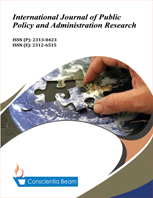Statistical assessment of employees’ perception of nonmonetary compensations: The case of a regional hospital
DOI:
https://doi.org/10.18488/74.v10i3.3528Abstract
Organizations often attempt to incentivize employees with nonmonetary rewards for the purpose of increasing workers’ productivity. The problem is that employers don’t always know which nonmonetary rewards are most beneficial to the employees and the organizational goal. Therefore, we attempt to investigate the statistical significance of employees’ perceptions of nonmonetary rewards at the workplace. A questionnaire was administered to the employees of the Accounting Department of a regional hospital to indicate their perception of the relevance of the nonmonetary rewards available to them vis-à-vis their work productivity. Employees’ preference for each of the five nonmonetary rewards was measured on a binary scale of yes, the nonmonetary reward was valuable, or no, the nonmonetary reward was not valuable. The acquired data underwent analysis to examine the proportion of workers who expressed a preference for one nonmonetary reward over another. This analysis was conducted using the conventional normal probability distribution, ensuring that the condition of a large sample size was satisfied. We concluded that not all nonmonetary rewards were considered valuable by the employees and that supervisors’ recognition of workers’ good ideas at work and collegiality with coworkers were considered prime nonmonetary rewards. Additionally, non-monetary rewards that have no close substitutes or that employees cannot easily provide for themselves—such as supervisors praising employees for their creative ideas at work—are significant drivers of engagement and productivity in small- and medium-sized businesses like the one used for our research. This research provides managers with empirical and valuable information regarding nonmonetary incentives and reward programs.

